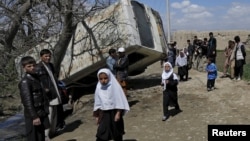The U.N. Children's Agency, UNICEF, said nearly half of all school-aged children in Afghanistan — nearly 4 million kids — are out of school due to conflict.
The findings in a new report represent a setback for the country, where such high rates of out-of-school children have not been seen since 2002, just after the Taliban was ousted.
"If girls and boys stay out of school, it becomes very difficult to get them back into school," UNICEF Executive Director Henrietta Fore told reporters on Monday. "Once you lose them, it's very hard to return."
Girls are especially affected, making up some 60 percent of the out-of-school population, and putting them at higher risk of discrimination, exploitation and child marriage. In provinces most affected by conflict, including Kandahar and Helmand, up to 85 percent of girls are not attending classes.
The study said child marriage is the second most reported reason for girls dropping out of school.
Although Afghanistan's constitution calls for free education, and the 2008 Education Law makes primary and lower secondary education mandatory, the main challenge appears to be getting young people to start school in the first place. Conflict, insecurity, displacement, migration, natural disasters, poverty and lack of access are among the obstacles.
On a positive note, the study found that once in school, dropout rates are low. About 85 percent of children who start primary school, and more than 90 percent who start lower secondary school, stay to complete it.
And national literacy rates are on the rise. According to an Afghan survey, 54 percent of 15-24 year olds were literate in 2017, compared to only 31 percent in 2005.
"We've got to get them back into school," Fore said. "We've got to teach them life skills and work skills."
The government of Afghanistan has designated 2018 as the year of education in an effort to reverse the trend.
UN: Conflict Keeps Half of Afghan Students Out of School

UNITED NATIONS —



